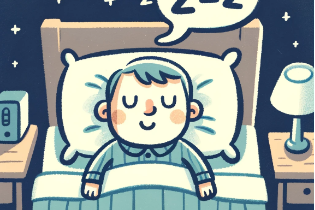What is Snoring?
Snoring is a common condition that occurs when airflow through the mouth and nose is partially obstructed during sleep, causing the surrounding tissues to vibrate. This vibration produces the characteristic sound of snoring, which can range from a soft noise to a loud, disruptive sound.
How Does Snoring Happen?
Snoring occurs when the muscles in the throat relax too much during sleep, causing a partial blockage of the airways. As air struggles to move through these narrowed air passages, the tissues of the throat, tongue, and soft palate vibrate, producing the snoring sound.
There are several parts of the respiratory system involved in snoring, including:
Nasal Passages: Blockages in the nose due to allergies, a deviated septum, or a cold can contribute to snoring.
- Soft Palate and Uvula: When the soft palate (the back part of the roof of the mouth) and the uvula vibrate, they can cause snoring.
- Tongue: A relaxed tongue can fall backward and obstruct the airway, especially during sleep.
Common Causes of Snoring
- Obstructed Nasal Airways: Nasal congestion due to colds, allergies, or a deviated septum can block air passages and lead to snoring.
- Overweight or Obesity: Excess weight, particularly around the neck, can put pressure on the airway, increasing the likelihood of snoring.
- Sleep Position: Sleeping on your back can cause the tongue and soft tissues in the throat to collapse, leading to obstruction of the airway.
- Alcohol Consumption: Alcohol relaxes the muscles in the throat, increasing the chances of snoring.
- Age: As people age, the throat muscles tend to relax more during sleep, which can contribute to snoring.
- Obstructive Sleep Apnea (OSA): This is a more serious condition where snoring is accompanied by repeated interruptions in breathing. OSA requires medical attention because it can lead to other health complications, such as high blood pressure and heart disease.
Health Implications of Snoring
Snoring can sometimes be more than just a nuisance. It can affect sleep quality, leading to daytime fatigue, irritability, and difficulty concentrating. If snoring is caused by Obstructive Sleep Apnea (OSA), it may be linked to more serious health problems, including:
- High blood pressure
- Heart disease
- Stroke
- Diabetes
In such cases, a healthcare professional should be consulted to determine if treatment is needed.
Treatment Options for Snoring
The treatment for snoring depends on the underlying cause. Here are some potential solutions:
- Lifestyle Changes: Losing weight, avoiding alcohol before bed, and sleeping on your side can help reduce snoring.
- Nasal Strips or Sprays: Nasal strips and decongestant sprays can help open up the nasal passages, allowing for better airflow.
- Oral Appliances: Special mouthpieces can be worn at night to help keep the airway open by repositioning the jaw and tongue.
- Continuous Positive Airway Pressure (CPAP) Therapy: For those with obstructive sleep apnea, a CPAP machine delivers a steady stream of air through a mask to keep the airway open during sleep.
- Surgery: In more severe cases, surgery may be recommended to remove excess tissue or correct structural issues like a deviated septum.

